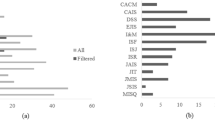Abstract
Social media continues to gain enormous popularity. Therefore, it is not surprising that this attracts the interest of researchers to study this cyber-social phenomenon particularly motivation issues as one of the most important axis in the social media literature. However, an analysis of literature concerning the motivations for using social media reveals a lack of studying professional networking sites compared to friendship-oriented social media (i.e. online social networks) and most particularly Facebook, despite the obvious interest that they present. Particularly as in the B2B context, interest in them exceeds that of online social networks (OSN) including even Facebook. Currently, a few number of researches who have become interested in studying the category of professional networking sites, but they did so from only the individual’s point of view. However, it is also necessary to consider the motivations for using them from a company’s point of view. To our knowledge, no research has been undertaken to study the motivations for using professional networking sites for both individuals and companies. For this purpose, we conduct a research by applying the ‘Uses & Gratifications’ Theory to explain the user behaviour in the field of professional networking sites. To collect data, 8 face-to-face interviews with companies and 5 focus groups with individuals were conducted.
The results permit to identify two types of motivations: contextual motivations and generic motivations in which a comparison with those previously found in the field of OSNs can be done.
Access this chapter
Tax calculation will be finalised at checkout
Purchases are for personal use only
Similar content being viewed by others
Notes
- 1.
In the sense that these researches include several social media at the same time in their samples.
- 2.
e-Customer Relation Management.
- 3.
We remind that Papacharissi & Mendelson results (2011) demonstrate that the use of the Facebook is mainly ritualistic.
- 4.
e.g. for individuals: gender, professional status…/ for companies: company size, nature of the hierarchical position….
References
Papacharissi, Z., Mendelson, A.: Toward a new(er) sociability: uses, gratifications and social capital on facebook. In: Stelios Papathanassopoulos (Ed.) Media Perspectives for the 21st Century (2011)
Joinson, N.: ‘Looking at’, ‘Looking up’ or ‘Keeping up with’ People? Motives and uses of facebook. In: Proceedings of the 26th Annual SIGCHI Conference on Human Factors in Computing Systems, pp. 1027–1036 (2008)
Special, W.P., Li-Barber, K.T.: Self-disclosure and student satisfaction with Facebook. Comput. Hum. Behav. 28(2), 624–630 (2012)
Grissa, K.: What makes opinion leaders share brand content on professional networking sites (e.g LinkedIn, Viadeo, Xing, SkilledAfricans…). In: 2016 International Conference on Digital Economy (ICDEc), Carthage, pp. 8–15 (2016)
Florenthal, B.: Applying uses and gratifications theory to students’ LinkedIn usage. Young Consumers 16(1), 17–35 (2015)
Moeser, G., Morryson, H., Shwenk, G.: Determinants of online social business network usage behavior: applying the technology acceptance model and its extensions. Psychology 4(4), 433–437 (2013)
Lampe, C., Ellison, N., Steinfield, C.: A Face(book) in the crowd: social searching vs. social browsing. In: Proceedings of the 2006 20th Anniversary Conference on Computer Supported Cooperative Work, pp. 167–170. ACM Press, New York (2006)
Acquisti, A., Gross, R.: Imagined communities: awareness, information sharing and privacy on the facebook. In: Proceedings of Privacy Enhancing Technologies Workshop, pp. 36–58, Cambridge (2006)
Steinfield, C., Ellison, N., Lamp, C.: Social capital, self-esteem, self-esteem, and use of online social network sites: a longitudinal analysis. J. Appl. Dev. Psychol. 29(6), 434–445 (2008)
Dunne, A., Lowler, M.A., Rowley, J.: Young people’s use of online social networking sites: a uses and gratifications perspective. J. Res. Interact. Mark. 4(1), 46–58 (2010)
Raacke, J., Bond-Raacke, J.: MySpace and facebook: applying the uses and gratifications theory to exploring friend-networking sites. Cyberpsychol. Behav. 11, 169–174 (2008)
Brandtzaeg, P.B., Heim, J.: Why people use social networking sites. In: Online Communities and Social Computing, pp. 143–152 (2009)
Papacharissi, Z., Rubin, A.M.: Predictors of internet use. J. Broadcast. Electron. Media 44(2), 175–196 (2000)
Ridings, C.M., Gefen, D.: Virtual community attraction: why people hang out online. J. Comput. Medicated Commun. 10(1) (2004)
Lampe, C., Wash, R., Velasquez, A., Ozkaya, E.: Motivations to participe in online community. In: 28th Conference on Human Factors in Computing Systems, pp. 1927–1936 (2010)
Barker, V.: Older adolescents’ motivations for social network site use: the influence of gender, group identity, and collective self-esteem. CyberPsychol. Behav. 12, 209–213 (2009)
Stenger, T., Coutant, A.: Médias sociaux: clarification et cartographie- pour une approche sociotechnique. Décisions Mark. 70(24), 107–117 (2013)
Kaplan, A.M., Haenlein, M.: Users of the world, unite! The challenges and opportunities of social media. Bus. Horiz. 53(1), 59–68 (2010)
Ito, M.: Hanging Out, Messing Around, and Geeking Out: Kids Living and Learning with New Media. The MIT Press, Cambridge (2010)
Tufekci, Z.: Grooming gossip, facebook and myspace. Inf. Commun. Soc. 11(4), 544–564 (2008)
Tosun, L.P.: Motives for facebook use and expressing ‘‘true self’’ on the internet. Comput. Hum. Behav. 28, 1510–1517 (2012)
Sheldon, P.: The relationship between unwillingness-to-communicate and students’ facebook use. J. Media Psychol. 20(2), 67–75 (2008)
Ruggiero, T.E.: Uses and gratifications theory in the 21st century. Mass Commun. Soc. 3(1), 3–37 (2000)
Cvijikj, I.P., Michahelles, F.: Online engagement factors on facebook brand pages. Social Network Analysis and Mining (2013)
Acknowledgement
The author gratefully thanks his doctoral supervisors respectively Inés De La Ville and André Leroux.
Author information
Authors and Affiliations
Corresponding author
Editor information
Editors and Affiliations
Rights and permissions
Copyright information
© 2017 Springer International Publishing AG
About this paper
Cite this paper
Grissa, K. (2017). What “Uses and Gratifications” Theory Can Tell Us About Using Professional Networking Sites (E.G. LinkedIn, Viadeo, Xing, SkilledAfricans, Plaxo…). In: Jallouli, R., Zaïane, O., Bach Tobji, M., Srarfi Tabbane, R., Nijholt, A. (eds) Digital Economy. Emerging Technologies and Business Innovation. ICDEc 2017. Lecture Notes in Business Information Processing, vol 290. Springer, Cham. https://doi.org/10.1007/978-3-319-62737-3_2
Download citation
DOI: https://doi.org/10.1007/978-3-319-62737-3_2
Published:
Publisher Name: Springer, Cham
Print ISBN: 978-3-319-62736-6
Online ISBN: 978-3-319-62737-3
eBook Packages: Computer ScienceComputer Science (R0)




